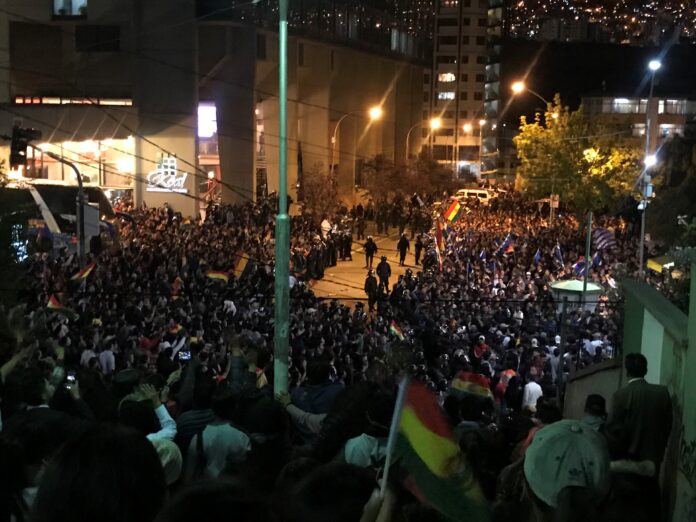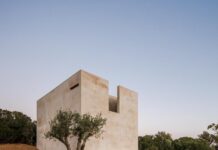Last 20th October, in La Paz there was no one on the street: everybody was glued to the televisions to hear the results of the election day. On state TV, political analysts rejoiced for the large voter turnout, saying goodbye to what they considered to be a democratic fiesta. This made us smile a little since in Bolivia voting is a legal duty and abstention foresees the inability to access to your current account for at least three months. It was around 8:00 pm when the first results were published through the Trep (Transmission of Preliminary Electoral Results).
Considering a projection of 87.5% of the votes, the outgoing President Evo Morales del Mas (Movimiento al socialismo) reaches around 45.6%. On the other hand, Carlos Mesa, his main opponent of Comunidad Ciudadana, as well as former President from 2003 to 2005, reaches around 38.2%.
A couple of hours later, Morales’ first declarations arrive from Palacio Quemado, seat of the Government: “Ganamos una vez más, son cuatro elecciones consecutivas que ganamos, es histórico e inédito” (“We win again, it is the fourth consecutive elections that we win, it is historical and unusual “). This statement has been considered by many to be premature. Then, the interruption of the preliminary calculation comes by the TSE (Supreme Electoral Court), which begins the counting of official data.
For the following 24 hours, no electoral data has been transmitted to the public. The oppositions consider the figures very strange and begin to heat up. First and foremost, Carlos Mesa, who calls his supporters to converge to the capital around the building where the official counting is about to end. Someone is already shouting “fraud”, cheating, fraud, or electoral fraud. Morales’s opponents are separated from his supporters by a cordon of police officers. The situation is quite tense. Disparaging choirs and insults are chanted by both sides, when finally, around 11.00 pm on October 21st, the TSE reveals the official results recorded on about 95% of the votes: 36.8% for Mesa, 46.9% for Morales. Opponents of the alleged winner are enraged and the police begin its containment action: tear gas is fired and one of them hits the Dean of the Umsa, (Universidad Mayor de San Andrés) Waldo Albarracín, who took to the streets together with the opposition , against, what they say, a dictatorship that has lasted for 13 years. It is the beginning of days of high tension, which produced to 2 dead, 140 wounded and 190 arrested people.
To understand how we have reached this point it is necessary to take a step back and retrace the rise to power of the first Indio president in the history of South America. Former leader of the trade union movement Cocaleros, coca farmers in the Chapare region, Evo Morales leads the Bolivian state since the 2005 elections, which was called in advance following the political and social crisis that plagued the country after the governments of Gonzalo Sanchez de Lozada and Carlos Mesa. Then the so-called “gas war” raged, an intense internal conflict between the government and civil society, which was against to exporting natural resources to Mexico and to the Us through the Chilean ports. With these premises, Morales’ rise to power was preceded by a rapid consensus, generated above all by a strong anti-American rhetoric, fueled by the heated rivalry that existed between Morales and US Ambassador Manuel Rocha. In this way the Mas secured the support of the popular, indigenous and peasant groups of the country, taking power in 2006. His victory was celebrated with an indigenous rite in the Tihuanaco territory, just over to the west of La Paz. In this occasion, Morales was crowned Apu Mallku, supreme leader of the indigenous people of the Andes, symbolizing the end of 500 years of colonialism.
In foreign policy he immediately sought for the support of other socialist governments, finding it in Venezuela and Cuba. In domestic politics he began what he himself called Proceso de Cambio, characterized by three fundamental elements: the nationalization of hydrocarbons, social policies and the constitutional reform.
The first has been the subject of various controversies, provoked both by moderate opponents and by the radical left, which considers the nationalization a never-ending process. In fact, the Morales’ governments have never proceeded to expropriate refineries, preferring to renegotiate national contracts. This, according to his supporters, would have given way to the launch of the country’s economy. Although this is obviously not a real nationalization, the Mas exponents continue to call it this way, arguing that it helped free Bolivia the International Monetary Fund and allowed the government to pay the social policies as decided.
Proceso de Cambio’s second point concerns precisely the social policies. It would be a euphemism to define Bolivia a “difficult” country. Historically, Bolivia is considered one of the most backward countries in South America and has almost always stood out among the worst positions considering poverty and literacy rates. Morales outlines his social development project around the Aymara concept of Suma Qamaña, namely the good life, an indigenous concept that describes the spiritual and material balance of the individual and his harmonious relationship with all forms of life. In this context, the stated objectives were the fight against illiteracy and poverty. The first was fought thanks to the foreign friends’ help, who sent economic and professional resources to Bolivia and received young Colombians in their universities. As far as poverty is concerned, the Morales government in 2009 increased the minimum salary by 50% and shifted the retirement age from 65 to 58, although most Bolivians work through an informal economy. These actions were made possible by the constitutional reform, the third element of the Proceso de Cambio. This reform saw the light after 3 years of work, from 2006, the year of formation of the constituent assembly, to 2009, when it was approved through a constitutional referendum won with 63% of the votes. The reform was wide and deep. Among the most important innovations, it introduced the possibility of direct election of the Head of State, the prohibition of privatization of Bolivian raw materials, the introduction of a roof of 5,000 hectares for landed property and the right of indigenous citizens to make use of their own independent legislation. From that moment on, Bolivia began to call itself a multi-national state.
Subsequent re-elections of Morales will occur: three consecutive mandates, and today a possible fourth, with opponents shouting at the dictatorship and fraud and supporters accusing them of plotting a coup d’état. Morales is still a very loved and popular leader in Bolivia, especially among the poorest sections of the society. Yet, the Constitution, written and wanted by himself, clearly states that no president can run for more than two terms. The accusations of authoritarianism and personalization of power started when the President called a referendum in order to open up the possibility of a third candidacy. Nos won but just by a little, just enough for Evo to appeal to the Constitutional Court, which decreed that prohibiting the candidacy of Morales would have damaged his civil and political rights and, above all, that the constitutional reform could not have retroactive effect: so that, the third term became de facto the second. Two weeks after the election results were announced, Bolivia is still in a state of agitation. Roadblocks and clashes continue between supporters and opponents of the Mas. Meanwhile, accusations and facts halfway between comic and grotesque have emerged: votes attributed to people who have been deceased for decades, computer scientists who claim to possess overwhelming evidence of the fraud and who say they have been threatened, finally the helicopter of Morales and his staff forced to an emergency landing following a breakdown (it is unclear whether by tampering or malfunction).
Meanwhile, Carlos Mesa consulted the opinion of the OAS (Organization of American States) regarding the transparency of the elections. The OAS expressed its concern in this regard, strongly advising them to proceed in any case with the ballot. The concern of the institution was followed by those of the EU, Brazil, Argentina and the Us. For its part, ironically, Morales has sent concerns and advice back to the sender, inviting the OAS to respect the Constitution. He has also declared: “Si se prueba el fraude, vamos a la segunda vuelta” (“If you have the prove of the fraud, let’s go to the ballot”). The Mas, however, accepted the recount by the OAS and, however, Comunidad Ciudadana surprisingly refused it, due to alleged unclear agreements between the Government and the OAS itself, thus causing, in fact, that the center of gravity of the the opposition shifted from Carlos Mesa, centrist, to Fernando Camacho, spokesman for the Comité Pro Santa Cruz, a notoriously conservative, ultra-Catholic and militarist civic movement, which took the opportunity to aggressively amplify the speech that considers the victory of Morales fruit of fraud and its governments a real dictatorship. At the moment, it is difficult to predict developments in the situation. The country seems polarized, split in two and the opposition is, in turn, even more fragmented. Whatever the OAS’s response is, it is foreseeable that there will be always social partners who will oppose it. The tension is likely to continue for months.
Bolivia, during the 13 years of the Morales governments, has undoubtedly seen an astonishing development, settling as one of the fastest growing economies in South America, reducing the poverty rate from 38% to around 18%, realizing a rising GDP by around 5% and inflation at 1.8%. In 2009, UNESCO declared the country free from illiteracy. All of these achievements did not happen by chance and it is reasonable to think that it has a direct relationship with the 13 years of indigenous socialism of Evo Morales and the Mas. The Indian leader has served the cause of the people during his long government, yet it is important to underline how the time has come, and indeed already for some time, to appoint a political heir. The thing for now does not seem to be in the program, but if it does not happen, the accusations of authoritarianism will legitimize themselves, and with them they could bring the harsh wind of reaction. Fascist or capitalist.








